A divorced couple does not necessarily mean a broken family. Contrary to common perception, a couple who decides to live separately and divorce does not necessarily become two separate people with no responsibilities. Even when they are not man and wife anymore, they continue to be parents to their children. By setting some co-parenting rules and adhering to them, they can be loving and responsible parents like they were before.
With co-parenting, you can provide your children with the family that they need. Let’s have a look at what co-parenting looks like. Comparative research conducted by Dr. Linda Nielsen, a professor of Adolescent and Educational Psychology at Wake Forest University concludes that children in shared physical custody families—with the exception of situations where children need protection from an abusive or negligent parent—have better outcomes across a variety of measures of well-being than do children in sole physical custody.1
What does co-parenting look like?
Table of Contents
Divorce is increasingly being seen as a better alternative than being stuck in an unhappy marriage if the issues between the couple are irreconcilable. As the structure, shape and types of families continue to diversify, people are beginning to realize that just because their marriage could not work out doesn’t mean they are bad parents.
Or that they cannot parent their children as a team despite not being married anymore. In such cases, couples opt for co-parenting, so that their children do not have to bear the brunt of separation. Co-parenting by definition is an initiative that a lot of couples take after their divorce so that their children can get the best of both the parents.
Unless one of the partners in a marriage has faced grave issues like substance abuse, domestic abuse or sexual abuse, both partners may decide on active participation in their children’s lives to minimize the disruption caused by the parents’ separation.
12 Co-Parenting Rules For Divorced Couples
The importance of co-parenting is more essential than you can imagine. Co-parenting ensures the mental and emotional well-being of the children. The sole purpose of co-parenting is to give the children the life they deserve.
This having to set co-parenting boundaries that allow the parents to set aside their relationship problems and focus on the children. To do so, certain rules need to be followed. Keep reading to know the 12 important rules of co-parenting, which will eventually answer the question: “Is a divorced family still a family?”
1. Put your pain and anger aside
You might be wondering, should you stay together for your children’s sake? The answer is, no. Chances are that you and your partner ended up in a divorce because of not-so-amicable reasons, which is why staying together even for the children’s sake may seem out of question, but you need to remember that a bad husband or wife does not necessarily mean a bad parent.
Co-parenting rules suggest that you put the pain and anger of all things that went wrong in a box and focus on healthy parenting for your children. If your children find you constantly fighting and throwing tantrums at each other, it will create unnecessary childhood trauma that will be extremely difficult for your children to recover from.
That’s why one of the good co-parenting rules to swear by is to learn how to bottle up all your anger, resentment or whatever other negative emotions you may be experiencing in front of your children. You and your spouse are now separated, so let the past bury its ghosts.
Focus on the future, which entails – among other things – the responsibility of raising your children the right way.
2. Don’t drag your children into your issues
Parents, those kids in the house are your children. They are not your messengers. You need to know better than dragging your children into your issues for successful co-parenting. Do not put your children at the center of your conflicts.
That is one of the most inappropriate co-parenting approaches there can be. At the same time, you need to avoid talking negatively about each other to your children as well. By all means, prepare your kids for the divorce but don’t do it at the cost of your spouse’s image in their eyes.
Your children deserve the love of both their parents and they should not be influenced or biased towards one parent just because they bad-mouthed their ex. Free your children from your influence and let them decide their feelings for their respective parents.
3. Communicate more with each other
For co-parenting successfully, you and your ex-spouse need to be in sync about parenting techniques, values and ground rules. You do not have to talk about your past or anything that went wrong, but you do need to communicate with each other about things that matter.
Consider this a part of setting co-parenting boundaries that allow you to be parents without being partners. It may seem impossible, especially in the case of a bad divorce, but you need to remind yourself of the primary and the most important purpose of communication: your children. Yes, you are divorced as a couple but be united as parents.
If looking at each other’s faces seems out of the question, communicate via texts and calls, but do it nonetheless. Make requests, really listen to each other and keep your conversations focused solely on your children.
Related Reading: Divorce And Remarriage: I Need To Remarry For Myself, Not For My Son
4. Do not take important decisions without consulting each other
One of the most basic co-parenting rules is that you work as a team. That mean reaching out and taking each other’s advice on all important decisions regarding your children. Yes, even if you know what’s best for your children.
It is one thing to give leeway and let them have ice-cream for dinner on a Saturday once in a while, but quite another to plan to change their school or move cities without telling ex. You cannot share responsibilities of co-parenting unless you’re both part of such decision-making processes.
Similarly, when it comes to important decisions like medical attention, education, financial situation, etc. do not take decisions regarding these without talking to your ex-partner about it.

Co-parenting is all about holistic growth for your children. Make sure you communicate with the other parent about any important decisions concerning your children.
5. Set a realistic budget
Co-parenting boundaries are not only limited to communication. After a split, both parents might not have the same amount of financial stability. It is an important rule of co-parenting to be open about your financial situation and distribute finances accordingly, in terms of child maintenance and financial assistance after the divorce.
If one parent pays for the child’s school tuition, the other can look after medical insurances and other expenses. Set a realistic budget for your children and put your ego aside. Financing is an important aspect of co-parenting rules, and it needs to be dealt with maturely, not with an ego of “I can raise my child all on my own.”
6. Don’t lie to your children about future relationships
Every child deserves to know the truth about their parents. Do not lie to your children if you start dating after the divorce. Instead, sit your children down and talk to them about your new relationship. Make it seem amicable and assure them that they will not be affected by it in any way.
Of course, waiting a while before introducing a new partner to your children is the sensible thing to do. You don’t want to make someone a part of their life before you’re absolutely sure about the future of this relationship.
Co-parenting while in a relationship can also be tricky because you may not want to share the details of your new relationship with your ex-spouse. If your children are old enough to understand these intricacies, talk to them and request them to not break the news to the other parent. Tell them that it’s not that you want to hide the relationship but you’d like to tell them when the time is right.
Related Reading:Divorce at 50: How I Found a New Life and Happiness
7. Support each other’s roles as parents of the children
Managing shared custody of kids requires both of you to be on the same page for the sake of the children. Children tend to fight with their parents, which is not unusual. However, you as a parent need to make sure that you do not let your bias or hatred toward your ex-partner influence your children’s thought process when they are complaining about their other parent to you.
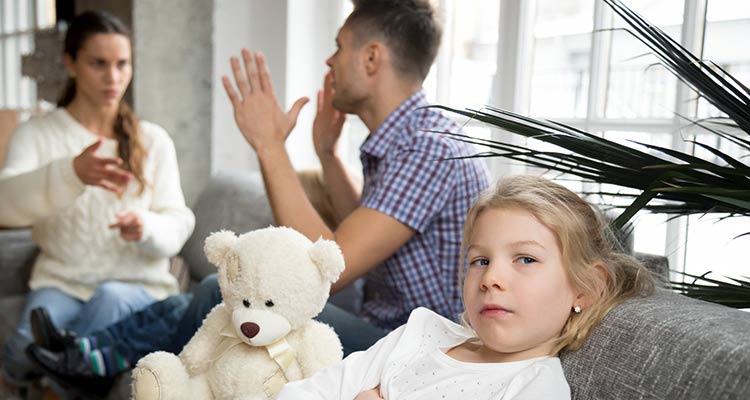
Together or apart, your ex is still an equal parent to your children. You need to support each other and guide your children in the right direction and ensure that your children believe that both their parents love them and care for them in their own ways.
Working together as a team can be equally hard if you still have feelings for your ex and it was them who asked for a divorce. In case you decide to co-parent with someone you still love, make sure your feelings don’t impede your ability to put your children’s interests first.
8. Establish certain ground rules
Another aspect of co-parenting boundaries: establishing ground rules. These ground rules are for both the parents and for the children as well. Set certain ground rules like nobody will bring personal matters into conversations regarding the children. Your toxic relationship can have a profound impact on your child’s future life.
Secondly, if the split was very terrible, then set a rule that most communications will only happen via text or emails. This will help you avoid digressing from the focus. Explain divorce to your children keeping in mind their age, not your issues.
Then comes ground rules about children. Neither parent should go out of their way to create favoritism among children. Good co-parenting rules dictate that you support each other no matter what. If you want to be good role models for your children, treat each other with respect and kindness.
This means not hiding your children’s mistakes from each other so that they will prefer you over the other parent. Or letting them flout rules or slacking on disciplining them when they do something wrong. This is the textbook case of inappropriate co-parenting because while it may put you in your children’s good books for now, it will cost them dearly later in life.

9. Maintain consistency in routine for the children
An efficient routine is the best answer one can give for “what does co-parenting look like?” In an endeavour to be the better parent, you might give your children more liberty than they need. This means no midnight ice cream, no pizza for lunch and dinner, and no extra candies.
This is an important part of co-parenting rules as the schedule of your children should not be disturbed by living in two different places in a short span. To make sure consistency in routine is maintained, sit together and decide a timetable for you and the children.
Stick to that routine and make sure your children stick to it as well. Whether you’re still or co-parenting rules and dating, make sure that this routine is set in stone. Don’t compromise on bed time for a movie night with your new beau or let them miss soccer practice frequently for an outing with your partner.
Related Reading: 8 Negative Effects Of Divorce On Children
10. Don’t fret from compromising sometimes
When it comes to making important decisions, you might not want to bow down, but this works against the co-parent definition. You may not like your ex, but you do have one or more children together. To dwell on your ego is possibly the worst parenting mistake you are making in this scenario.
This means compromising when you have to. If the mother has an important meeting, the father can compromise not attending a friend’s party. If the father is not able to cover the children’s tuition fees entirely, the mother can compromise and dig into her savings for the sake of her children’s education.
Those who have been raising children together despite the divorce during the pandemic regard flexibility as one of the most crucial co-parenting rules under lockdown. Joyce and George, for instance, found their lives turned upside down when COVID-19 hit the US since Joyce works as a nurse.
George, with his work-from-home schedule, was better equipped to handle the children, so Joyce let them stay with him for 6 months. George, on this part, ensured that she got regular updates about the kids and scheduled regular video calls to keep them connected.
Always think about the highest purpose and compromise when you have to. There can be nothing more beneficial in working out the co-parenting rules.

11. Acknowledge your children’s concerns
Your children might prefer staying with one parent more than the other. In such cases, they may cry about not wanting to go to the other parent’s house. Do not see this as an opportunity to increase spite against your ex. Practice healthy co-parenting rules instead.
The importance of co-parenting is to acknowledge your children’s concerns and ask them what you can do to make the process easier. Assure them that they will have a great time at the other parent’s home and that they are lucky to have parents who love them so much.
Always look after your child’s concerns and practice love. By ensuring a healthy relationship between your children and your ex, you’re doing them a huge service by saving them from the issues of dysfunctional family ties.
12. Quality time over quantity time, always
Intimacy does not have to be based on the amount of time each parent stays with the children. Most parents while co-parenting are hung up on spending exactly an equal amount of time together. There does not have to be a 50-50 split of the time.
Instead, create a sensible division of time. If the schedule of one parent is more hectic than the other’s, let that parent have less time with the kids. Co-parenting is all about creating a structure that makes sense for your family.
Your priority should be creating a stronger bond with your children, and that is not governed by the duration of the time you spend together. Always remember that quality trumps quantity.
Is a divorced family still a family?
Shortly put, yes. A divorced family is still a family. Sure, there are two separate homes and the mother and the father might not get along really well, however, they still have a common purpose: their children. This is why divorced couples opt for co-parenting. By following the co-parenting rules, they make sure that their children never experience a lack of love, lack of belonging, or a lack of family. The children are the glue that holds their family together.
You may wonder: should you stay together for your children’s sake, but the truth is, you don’t have to. You can separate from your partner and still provide your children with a loving family. That is what co-parenting is here for.
FAQs
The bottom line of co-parenting successfully is that you have to put aside your feelings for your ex and find a way to give them the respect they deserve as your children’s parent. If they are a part of the children’s life, they will remain a constant presence in yours too. You have to be able to deal with that.
To set con-parenting boundaries, you need to take your past issues of the equation and focus solely on your children. Make sure that your interactions revolve around the kids to avoid getting into bickering matches or ending up sleeping together in a fit of nostalgia.
If your ex is difficult or you’ve had a nasty divorce, maintain your distance from them and communicate the essentials regarding co-parenting via texts or emails. If you just can’t stand each other, take the help of a mediator for setting the co-parenting rules at the time of the divorce.
How To Work On Your Relationship With The Stepchildren – Expert’s View
Parenting After Divorce: They Were Not Friends nor Good Parents
Your contribution does not constitute a charitable donation. It will allow Bonobology to continue bringing you new and up-to-date information in our pursuit of helping anyone in the world to learn how to do anything.








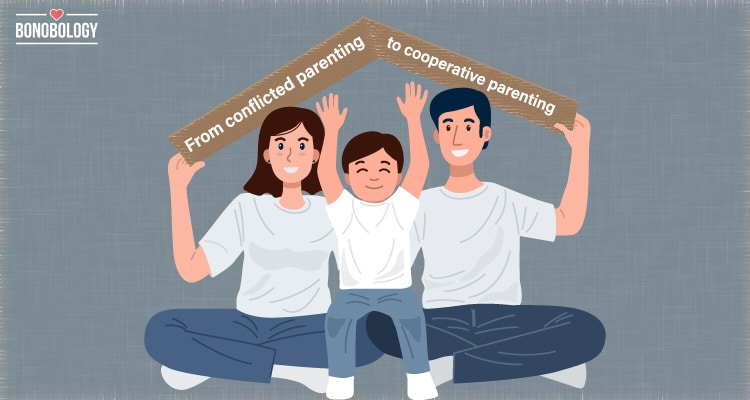

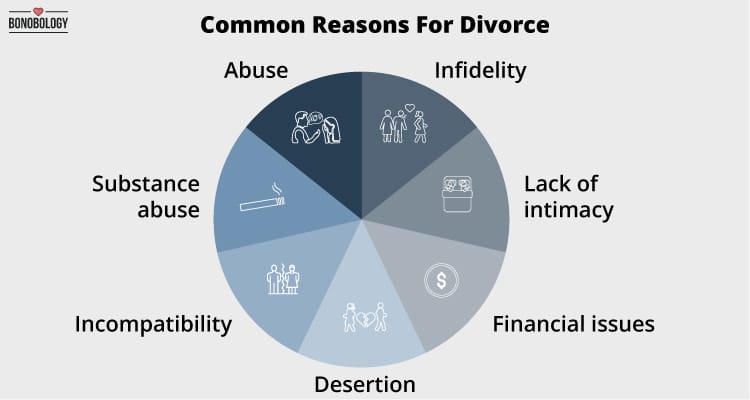




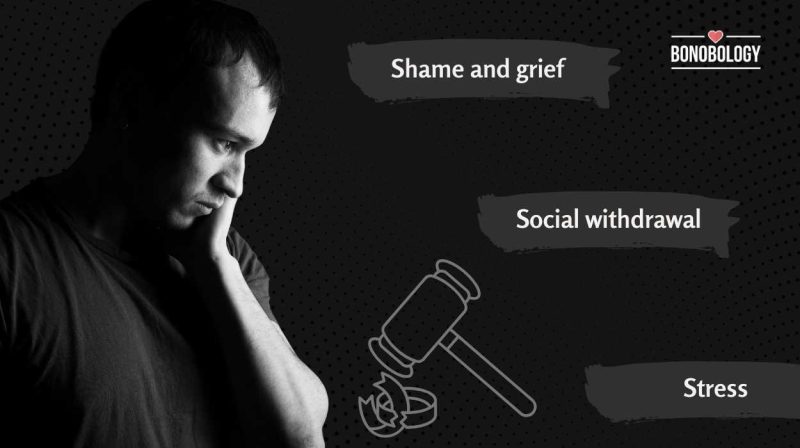
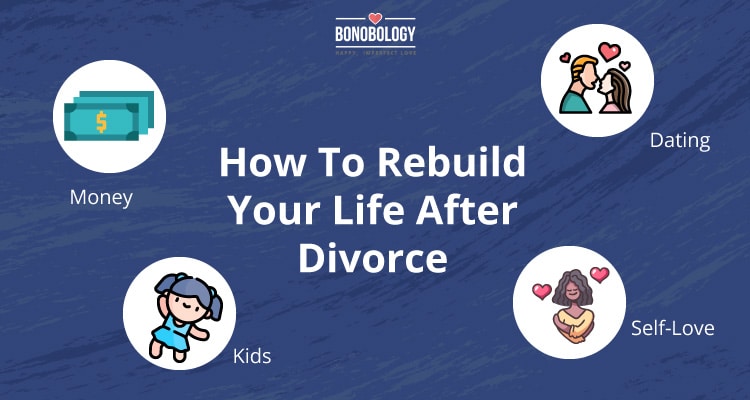





Featured
The Hidden Benefits Of Divorce
Top Legal Tactics for Alimony Disputes Between Parents
Divorce Regret: What Is It, Signs, And Ways To Deal
The Pros And Cons Of Being Your Own Divorce Lawyer
15 Subtle Yet Strong Signs Your Marriage Will End In Divorce
10 Things To Do When You Are Thinking About Divorce
10 Tips For Divorced Parents To Handle Joint Custody Effectively
9 Sneaky Divorce Tactics And Ways To Combat Them
15 Most Common Reasons For Divorce
How To Cope With Divorce As A Man? EXPERT ANSWERS
11 Ways To Remain Sane During a Divorce
7 Important Things To Know About Dating While Separated
The Top Rules Of Separation In Marriage To Make It Successful
Lonely After Divorce: Why Men Find It So Hard To Cope
How To Rebuild Life After Divorce: Handling Kids, Money, Dating, And Self-Love
Failed Celebrity Marriages: Why Are Celebrity Divorces So Common And Expensive?
Surviving Divorce at 50: How To Rebuild Your Life
Gray Divorce 101 – A Guide To Divorce After A Long Marriage
Expert Advice – When To Call It Quits In A Marriage
8 Examples Of Unhealthy Boundaries With Ex-Wife